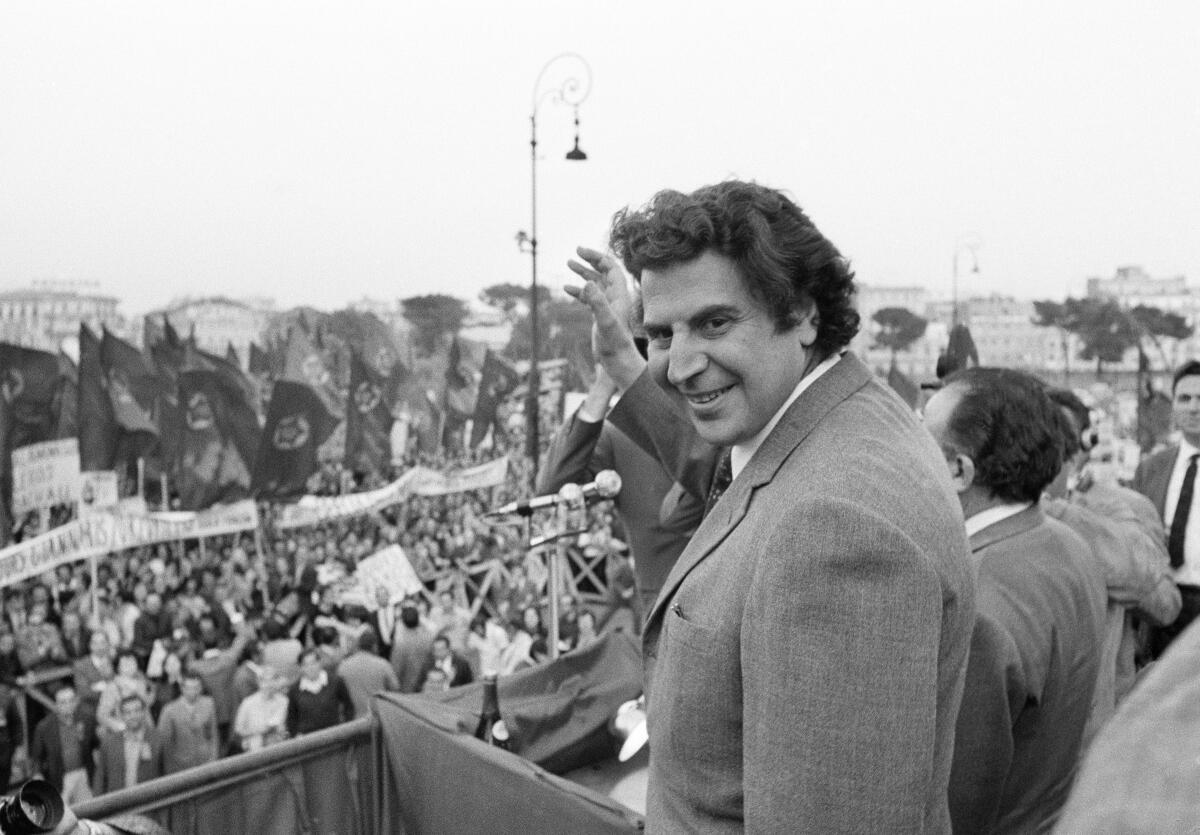Mikis Theodorakis, beloved composer who scored ‘Zorba the Greek’ and ‘Serpico,’ dies

Mikis Theodorakis, the beloved Greek composer whose rousing music and life of political defiance won acclaim abroad and inspired millions at home, has died at his home in Athens.
His death Thursday was announced on state television and followed multiple hospitalizations in recent years, mostly for heart treatment. He was 96.
Theodorakis’ prolific career produced a hugely varied body of work that ranged from somber symphonies and an anthem for the Palestinian Liberation Organization to popular television and the film scores for films such as “Serpico” and “Zorba the Greek.”
But the towering man with trademark worker suits, hoarse voice and wavy hair is also remembered by Greeks for his stubborn opposition to postwar regimes that persecuted him and outlawed his music.
The Greek flag was lowered to half-staff at the Acropolis for three days of national mourning.
“He wrote music that became intertwined with the historical and social developments in Greece in the postwar years, music that provided encouragement, consolation, protest, and support in the darker periods of our recent history,” Greek President Katerina Sakellaropoulou said in a statement
Born Michail Theodorakis on the eastern Aegean island of Chios on July 29, 1925, he was exposed to music and politics from a young age.
He began writing music and poetry in his teens, just as Greece entered World War II. During the war, he was arrested by the country’s Italian and German occupiers for his involvement in left-wing resistance groups.
Some of those same groups bitterly opposed the government and monarchy that led Greece after the war, leading to a 1946-49 civil war in which the Communist-backed rebels eventually lost.
Theodorakis was jailed and sent to remote Greek islands, including the infamous “reeducation” camp on the small island of Makronissos near Athens. He suffered tuberculosis, was thrown into a psychiatric hospital and was subjected to mock executions. As a result of severe beatings, Theodorakis suffered broken limbs, respiratory problems and other injuries that plagued his health for life.
Despite the hardships, he managed to establish himself as a greatly respected musician. He graduated from the Athens Music School in 1950 and continued his studies in Paris on a scholarship in 1954.
A prolific career as a composer began in earnest as he worked in a huge range of genres from film scores and ballet music to operas, as well as chamber music, ancient Greek tragedies and Greek folk music. His music series based on poems written by Nazi concentration camp survivor Iakovos Kambanellis, “The Ballad of Mauthausen,” described the horrors of the Holocaust.
But it was the Oscar-winning film adaptation of Nikos Kazantzakis’ “Zorba the Greek” in 1964 that made him a household name. The movie starring Anthony Quinn, Alan Bates and Irene Pappas earned three Academy Awards.
As Theodorakis’ fame grew, political turmoil in Greece continued, and his compositions were banned by a military dictatorship that governed the country between 1967 and 1974 — turning his music into a soundtrack of celebrations when democracy was restored and of resistance that would be played at protest rallies for decades.
Fans of his music were as varied as his work: The Beatles sang a cover of his song “If You Remember My Dream” (retitled “The Honeymoon Song”), and he was awarded the Lenin Peace Prize by the Soviet Union.
After his death was announced, international tributes served as a reminder of the numerous causes he supported. Ekrem Imamoglu, the mayor of Istanbul, thanked him in a tweet for his efforts to build friendship between old rivals Greece and Turkey. The Chilean ambassador in Athens visited his home in the Greek capital to thank his family for his speaking out against former dictator Augusto Pinochet.
“Greece lost part of its soul today,” Lina Mendoni, the Greek Culture Minister, wrote, praising Theodorakis’ ability to turn the work of poets into anthems sung by Greeks over generations.
Tireless in later years, Theodorakis continued to work with emerging artists and compositions that included music for the opening ceremony of the Barcelona Olympics in 1992, and maintained an active interest in politics.
He was a member of parliament for the Greek Communist Party for most of the 1980s but later served the cabinet of the conservative government. He spoke at rallies supporting Palestinian statehood, against the war in Iraq and more recently in opposition to an agreement to end a name dispute between Greece and North Macedonia.
His defenders saw him as a unifier, willing to take bold decisions to try to heal the country’s bitter and longstanding political divisions, many rooted in the Cold War. Fans who disagreed with him looked past his politics, and tributes to Theodorakis on Thursday came from all of Greece’s political parties as well as his fellow artists.
“He was a giant and we were all proud of him. His music, his life, he was unique,” singer Manolis Mitsias, who worked extensively with Theodorakis said. “Greece was orphaned today.”
Prime Minister Kyriakos Mitsotakis declared three days of national mourning, posting a photograph with Theodorakis at his home following a recent hospitalization.
“The best way to honor him, a global Greek, is to live by that message. Mikis is our history,” he said.
Theodorakis is survived by his wife of 68 years, Myrto Altinoglou, daughter Margarita Theodoraki and son George Theodorakis.
More to Read
Start your day right
Sign up for Essential California for the L.A. Times biggest news, features and recommendations in your inbox six days a week.
You may occasionally receive promotional content from the Los Angeles Times.






